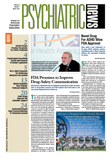I was very enthused by the article in the December 1, 2006, issue that cited Dr. Toya Clay's candid observation about the stigmatization of mental illness on Capitol Hill, where she was an APA congressional fellow. Such a stance is not only timely, but essential. As physicians and humanitarians, I believe it is our duty to help our leaders and other people have a more objective perception of how serious mental disorders are.
As most of us realize, people with emotional disturbances often stand out as “different.” In this way, they are judged as “the other,” rather than as one of us. In considering this philosophy, why not compare a patient with acute coronary artery syndrome or one suffering from inflammatory bowel disease to a psychiatric patient? The differences might seem obvious to most lay people and physicians who are not psychologically oriented. The patient with the organic disease is accepted as being critically ill, whereas the patient with delusions, hallucinations, dysphoria, or bipolar states is often looked upon as morally weak. Such a mindset is discriminatory and demeaning.
Our leaders and the general public must ask: Are we frightened by this patient? Is he or she a threat to our own self-concepts? Are we trying to defend ourselves against this “stranger”? Perhaps most of us can't answer such questions. Could it be that we are using defenses to keep our own unacceptable impulses in check?
Psychiatry, with its biological advances, appears to be quite different from the older analytical models of mental illness treatment. Regardless, we are slowly leaving the early childhood of psychiatry where these nonquantifiable derivatives continue to exist.
To quote Sigmund Freud: “No one who, like me, conjures up the most evil of those half-tamed demons that inhabit the human breast, and seeks to wrestle with them, can expect to come through the struggle unscathed.” Therefore, let us maintain equanimitas while continuing to reflect on what is disturbing us. This process may be painful and seem unscientific. If we choose to ignore this, we start to lose our empathy as healers and as scientists practicing an imperfect art.
Many of my patients suffering from major depression have described their malady as the worst pain they have had to bear. Too often, such people suffer in silence and, lacking proper intervention, suffer devastating consequences. They may shun treatment out of fear of societal judgment and retribution. A patient who suffers a massive myocardial infarction never endures the kind of judgment that a person with mental illness often must.
In conclusion, we must remove the stigma from mental illness. If our society is unsuccessful in doing this, psychiatry's scientific advances might come to naught.
